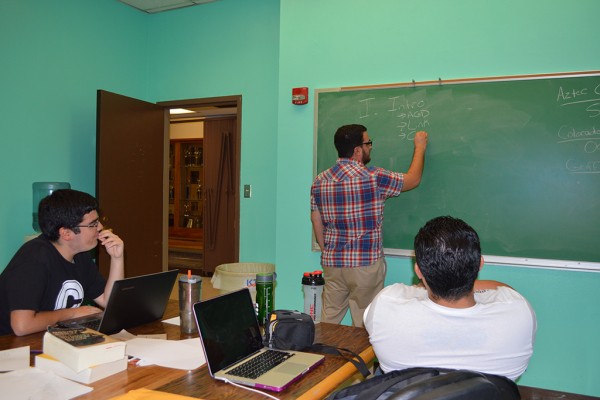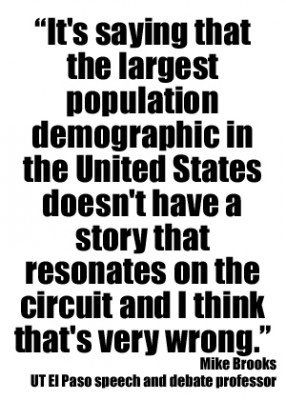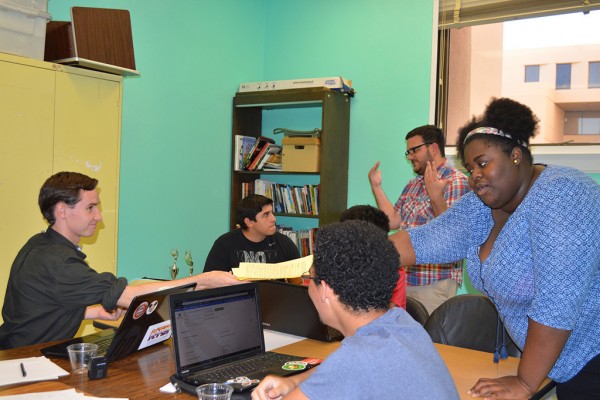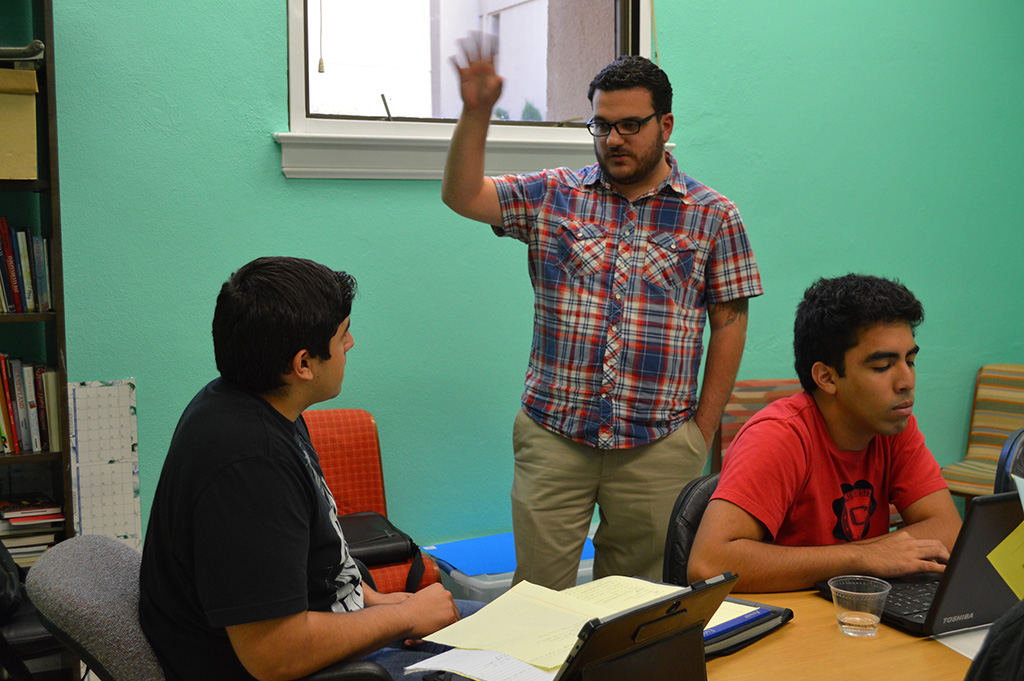EL PASO — For a while now, UTEP’s Speech and Debate team has faced a lack of literary diversity and its inaccessibility for use in competitive speeches and interpretive events.
With a minimal amount of dramatic literature that focuses on people of color, specifically Hispanics, the team has had to deal with a deficiency of available texts by and about people of color for student speeches and competitions.
Despite the lack of diverse materials, the University of Texas at El Paso team has traveled the nation for forensic competitions from Portland, Oregon, to Gainesville, Florida, presenting speeches on a variety of topics important to college students: from new medical technologies, race, LGBTQ and identity issues, among many others. In its more than 30 year history, the UTEP team has won hundreds of speech awards nationwide.
“The first thing that we really start with is figuring out an event and a topic,” said Carlos Tarin, associate director of the Speech and Debate program in the Department of Communication.
“From there it’s a matter of finding literature, doing research, outlining the speech, writing the speech, and then working to really craft it so that the message is as impactful as possible.”

Speech Coach Carlos Tarin goes over strategy with UTEP Speech and Debate team members. Photo by Katherine Alanis Ramirez, Borderzine.com
Latino experience hard to find in writing
According to Tarin and other borderland speech professors, Hispanic culture and literature is poorly represented within the competitive speech realm.
“I think Latino students are generally underrepresented in competitive forensics,” Tarin said. The sentiment is also echoed by students on the speech and debate team.
“It’s important to provide that diversity ,especially since we live in the borderland,” said Team Captain Manuel Duran, who is of Mexican-American background. “We grow up speaking Spanish and English, so we’re very unique and El Paso has a very unique level of culture and people in terms of identity – something that we can bring to the table.”
Mike Brooks, a long-time speech and debate professor at UTEP, said a lack of Hispanic literature to select from has placed the nation’s speech and debate communities at a disadvantage.
“I think it’s a real phenomena,” Brooks said. “I personally think because I live in El Paso I have a jaded point of view and feel that Hispanic and Chicano literature should be at the forefront and unfortunately, nationally, it’s not,” he said.
“There seems to be a larger body of work for African American literature and it’s very effective. It examines some of the struggles that African Americans have in society, within themselves, within the greater society, law enforcement, and structures in our world. And Chicano literature is not represented nearly as well.”
Speech team students say that finding literature within the realms of Hispanic drama and poetry for interpretative speeches isn’t that simple.
“I think it can be [difficult to find material] and so it’s difficult in the sense that your job is really to bridge that gap and find ways between a very narrow topic or a very specific angle that’s more universal so that people can care about it,” Tarin said. “There’s no limitation on what you can do really, if there’s a story that needs to be told it’s just a matter of finding that story.”
Publishing, distribution too limited
The problem, some say, is the publishing industry’s general lack of minority based materials.
“I think it’s more difficult to find mainstream publications that pick up on a lot of this so the big publishing houses don’t really take risks with this kind of literature,” said Tarin. “So you can find it, but it’s going to be through a lot more independent publishers, self-published stuff. It’s gonna be small publishing companies that are regional and not really distributing widely.”
 Duran, a senior biology student on the team, said that a significant problem for the team is finding diverse literature outside of UTEP’s Chicano Studies resources.
Duran, a senior biology student on the team, said that a significant problem for the team is finding diverse literature outside of UTEP’s Chicano Studies resources.
“I know the material is out there,” said Duran. “However, it’s been a little challenging when it comes to obtaining material that fits a particular argument or a particular theme. Sometimes the access could be limited or the published material is just not available.”
Brooks said the lack of available Latino related texts and resources has a negative impact on the speech and debate community not just locally but also nationally. “It’s saying that the largest population demographic in the United States doesn’t have a story that resonates on the circuit and I think that’s very wrong,” he said.
According to Tarin, at the same time, El Paso’s location on the U.S.-Mexico border somewhat mitigates the lack of minority-related literature nationally.
“We’re at a university that has really great resources for students interested in Chicano literature or issues about the border,” said Tarin. He encourages students looking for Latino-based material to reach out to the resources located at UTEP. “We have a lot of faculty that does research on this, and we have an entire Chicano Studies Program that I think students could learn a lot from and connect to the professors there.”
Prepping for speech, debate season
With the new competitive season underway, the speeches are in the process of being developed. “I’ve seen a lot of social justice issues presented in speeches, mainly dealing with race, particularly within the African American community, some of the pieces are astounding in terms of performance and content,” said Duran.
“Sometimes you want to talk about certain issues that you see on the news or are really current but you can’t really find material that’s published for that from a prose or dramatic-based concept.” He said this includes plays, poems and prose that discuss Hispanic culture and prominent events in Hispanic history, texts that are different from scholarly articles and research.
Aside from the literary obstacles that the team faces again this year, it is enthusiastic about the hiring of Speech Coach Tarin for the 2015-2016 school year.
“I think it’s a really interesting time for me and it’s a really exciting time for the team because I think there’s a lot of regrowth. There’s certainly a lot of rebuilding going on,” Tarin said.
“I’m hoping to make my presence on the team as impactful as possible by improving our competitive outcomes and increasing our connection with the local community, helping high schools, helping middle schools and building broader connections between UTEP and the community itself.”

Tarin’s plan to achieve these goals with “a much more hands on approach with coaching. I want to have measures of accountability, and work on consistency.”
The team will be competing at upcoming tournaments including the “Hell Froze Over” tournament hosted by UT Austin, a district tournament in Salt Lake City, Utah, and a national tournament at the University of Florida, among others.
Despite the dearth of diverse literature in the publishing world, members of the UTEP speech and debate team will continue to find ways to reflect diverse student voices as they compete. However, the future of literary diversity is still a matter for discussion on campuses nationwide.

